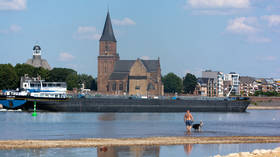German industry at risk as Rhine dries up – AP

Germany’s main industry lobby group, BDI, warned on Tuesday that some factories may have to curtail production or even halt it completely due to dwindling water levels on the Rhine River that are making it harder to transport cargo, the AP has reported.
Water levels on the Rhine at Emmerich, near the Dutch border, reportedly dropped by a further four centimeters (1.6 inches) over the last 24 hours, hitting zero on the depth gauge. Such a reading does not mean a river has run completely dry but rather that the depth has gone below an established level.
The authorities have pointed out the shipping lane itself still has a depth of almost 200 centimeters (78 inches), but the record low measurement of Tuesday morning highlights the extreme lack of water caused by months of drought throughout much of Europe.
“The ongoing drought and the low water levels threaten the supply security of industry,” deputy head of the BDI, Holger Loesch, was quoted as saying by the AP.
He explained that shifting cargo from river to train or road was difficult because of limited rail capacity and a shortage of drivers.
“It’s only a question of time before facilities in the chemical and steel industry have to be switched off, petroleum and construction materials won’t reach their destination, and high-capacity and heavy-goods transports can’t be carried out anymore,” Loesch warned, adding that this could lead to supply bottlenecks and loss of seasonal work.
The falling water levels of Europe's second-largest river have affected ferries and forced companies to seek alternatives for the freight they send via the waterway.
The Rhine River is vital for the transportation of raw materials including grain, chemicals, minerals, and coal and oil products, which form the base of many production chains. Two coal power plants have already been unable to run at maximum capacity because barges cannot bring in full loads, according to media reports.
For more stories on economy & finance visit RT's business section












